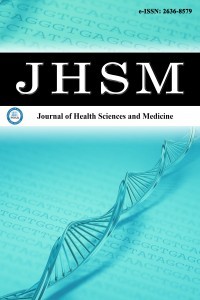1.
Gökbayrak Ş. Uluslararası göç ve kalkınma tartışmaları: beyingöçü üzerine bir inceleme. Ankara Üniversitesi SBF Derg 2008;63: 65-82.
2.
Kizito S, Mukunya D, Nakitende J, et al. Career intentions of finalyear medical students in Uganda after graduating: the burden ofbrain drain. BMC Med Educ 2015; 15: 1-7.
3.
Bakırtaş T, Kandemir O. Gelişmekte olan ülkeler ve beyin göçü:Türkiye örneği. Kastamonu Eğitim Derg 2010; 18: 961-74.
4.
Wickramasekara P. Globalisation, international labour migrationand the rights of migrant workers. Third World Quarterly 2008;29: 1247-64.
5.
Gouda P, Kitt K, Evans DS, et al. Ireland’s medical brain drain:migration intentions of Irish medical students. Human ResourcesHealth 2015; 13: 1-9.
6.
Yıldız GH, Kubilay Ö. Neoliberal sağlık politikaları ve hekimgöçü: neoliberal health policies and doctor migration. ScientificAcad Res 2022; 1: 1-13.
7.
Cohen S, Kamarck T, Mermelstein R. A global measure ofperceived stress. J Health Social Behavior 1983: 385-96.
8.
Eskin M, Harlak H, Demirkıran F, Dereboy Ç. Algılanan stresölçeğinin Türkçeye uyarlanması: güvenirlik ve geçerlik analizi.Yeni Symposium J 2013; 51: 132-40.
9.
Eser E, Fidaner H, Fidaner C, Eser SY, Elbi H, Göker E.WHOQOL-100 ve WHOQOL-BREF'in psikometrik özellikleri.Psikiyatri Psikoloji Psikofarmakoloji (3P) Derg 1999; 7: 23-40.
10.
Mittelmeier J, Gunter A, Raghuram P, Rienties B. Migrationintentions of international distance education students studyingfrom a South African institution: unpacking potential brain drain.Globalisation Societies and Education 2022; 20: 523-41.
11.
Nadir F, Sardar H, Ahmad H. Perceptions of medical studentsregarding brain drain and its effects on Pakistan’s socio-medicalconditions: a cross-sectional study. Pakistan J Med Sci 2023; 39:401-03.
12.
Turan FD. Hemşirelik dördüncü sınıf öğrencilerinin beyin göçüneyönelik tutumlarının yordayıcısı olarak kariyer karar verme vekariyer karar verme yetkinlikleri. Gümüşhane Üniversitesi SağlıkBilimleri Dergisi 2021; 10: 828-41.
13.
Filiz M, Karagöz MB, Karagöz N. Tıp fakültesi öğrencilerininbeyin göçüne yönelik tutumlarının değerlendirilmesi. KaradenizSosyal Bilimler Dergisi 2022; 14: 679-92.
14.
Anastasiou E. Populations in crisis: migration plans anddeterminants among medical students during the COVID-19pandemic. Migration Letters 2022; 19: 15-28.
15.
Emine Ö, Selvi H, Vayisoğlu SK, Ceyhan H. Hemşireliköğrencilerinde beyin göçüne yönelik tutum ölçeği geliştirilmesi:güvenirlik ve geçerlik çalışması. Cukurova Med J 2018; 43: 207-15.
16.
Özdemir A, İlhan A. Beyin göçü: öğrencileri yurt dışı eğitimeyönlendiren sebepler bağlamında nitel bir araştırma. İstanbulTicaret Üniversitesi Sosyal Bilimler Dergisi 2021; 20: 1159-86.
17.
Amorha K, Irobi C, Udoh A. The brain drain potential of skilledhealth workers from sub-Saharan Africa: a case study of pharmacystudents in Nigeria. Pharmacy Education 2022; 22: 654-63.
18.
Çıtıl R, Keten M. Tıp fakültesi öğrencilerinin uzmanlık tercihlerive mesleki kaygı düzeyleri. Gaziosmanpaşa Üniversitesi TıpFakültesi Dergisi 2021; 13: 171-92.
19.
Pratsinakis M. Greece’s emigration during the crisis beyond thebrain drain. Challenging mobilities in and to the EU during timesof crises: The case of Greece: Springer International PublishingCham; 2022. p. 27-45.
20.
Ash P, Frierson RL, Friedman SH. Malpractice and Liability inPsychiatry: Springer; 2022.
21.
Çelik Y, Kılıç İ. Hemşirelerde iş doyumu, mesleki tükenmişlik veyaşam kalitesi arasındaki ilişkiler. Kocatepe Tıp Dergisi 2019; 20:230-8.
22.
Erol A, Sarıçiçek A, Gülseren Ş. Asistan hekimlerde tükenmişlik:İş doyumu ve depresyonla ilişkisi. Anadolu Psikiyatri Dergisi2007; 8: 241-7.
23.
Kaynak KÖ, Öztuna B. The effect of the COVID-19 pandemicon the perceived stress levels and psychological resilience ofhealthcare professionals. J Health Sci Med 2023; 6: 208-14.

